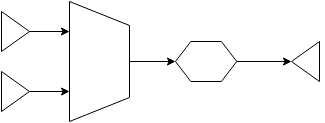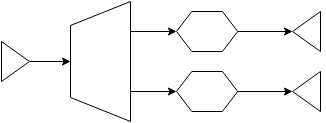Data Stream Processing API for GO
Rivers provides a simple though powerful API for processing streams of data built on top of goroutines, channels and the pipeline pattern.
err := rivers.From(NewGithubRepositoryProducer(httpClient)).
Filter(hasForks).
Filter(hasRecentActivity).
Drop(ifStarsCountIsLessThan(50)).
Map(extractAuthorInformation).
Batch(200).
Each(saveBatch).
Drain()With a few basic building blocks based on the Producer-Consumer model, you can compose and create complex data processing pipelines for solving a variety of problems.
A pipeline often assumes the following format: Producer, one or more Transformers and an optional Consumer
For more complex formats check the Combiners and Dispatchers sections.
A particular stream pipeline may be built composing building blocks such as producers, consumers, transformers, combiners and dispatchers.
Streams are simply readable or writable channels where data flows through asynchronously. They are usually created by producers providing data from a particular data source, for example files, network (socket data, API responses), or even as simple as regular slice of data to be processed.
Rivers provides a stream package with a constructor function for creating streams as follows:
capacity := 100
readable, writable := stream.New(capacity)Streams are buffered and the capacity parameter dictates how many items can be produced into the stream without being consumed until the producer is blocked. This blocking mechanism is natively implemented by Go channels, and is a form of back-pressuring the pipeline.
Asynchronously emits data into a stream. Any type implementing the stream.Producer interface can be used as a producer in rivers.
type Producer interface {
Produce() stream.Readable
}Producers implement the pipeline pattern in order to asynchronously produce items that will be eventually consumed by a further stage in the pipeline. Rivers provides a few implementations of producers such as:
rivers.FromRange(0, 1000)rivers.FromSlice(slice)rivers.FromData(1, 2, "a", "b", Person{Name:"Diego"})rivers.FromFile(aFile).ByLine()rivers.FromSocket("tcp", ":8484")
A good producer implementation takes care of at least 3 important aspects:
- Checks if rivers context is still opened before emitting any item
- Defers the recover function from rivers context as part of the goroutine execution (For more see
Cancellationtopic) - Closes the writable stream at the end of the go routine. By closing the channel further stages of the pipeline know when their work is done.
Lets see how one would go about converting a slice of numbers into a stream with a simple Producer implementation:
type NumbersProducer struct {
context stream.Context
numbers []int
}
func (producer *NumbersProducer) Produce() stream.Readable {
readable, writable := stream.New(len(producer.numbers))
go func() {
defer producer.context.Recover()
defer close(writable)
for _, n := range producer.numbers {
select {
case <-producer.context.Closed():
return
default:
writable <- n
}
}
}()
return readable
}The code above is a complaint rivers.Producer implementation and it gives the developer full control of the process. Rivers also provides an Observable type that implements stream.Producer covering the basic 3 aspects mentioned above that you can use for most cases: producers.Observable.
Our producer implementation in terms of an observable would then look like:
func NewNumbersProducer(numbers []int) stream.Producer {
return &Observable{
Capacity: len(numbers),
Emit: func(emitter stream.Emitter) {
for _, n := range numbers {
emitter.Emit(n)
}
},
}
}Consumes data from a particular stream. Consumers block the process until there is no more data to be consumed out of the stream.
You can use consumers to collect the items reaching the end of the pipeline, or any errors that might have happened during the execution.
It is very likely you will most often need a final consumer in your pipeline for waiting for the pipeline result before moving on.
Rivers has a few built-in consumers, among them you will find:
-
Drainerswhich block draining the stream until there is no more data flowing through and returning any possible errors. -
Collectorscollect all items that reached the end of the pipeline and any possible error.
Say we have a stream where instances of Person are flowing through, then you can collect items off the stream like so:
type Person struct {
Name string
}
diego := Person{"Diego"}
borges := Person{"Borges"}
items, err := rivers.FromData(diego, borges).Collect()
// items == []stream.T{Person{"Diego"}, Person{"Borges"}}
item, err := rivers.FromData(diego, borges).CollectFirst()
// item == Person{"Diego"}
item, err := rivers.FromData(diego, borges).CollectLast()
// item == Person{"Borges"}
var people []Person
err := rivers.FromData(diego, borges).CollectAs(&people)
// people == []Person{{"Diego"}, {"Borges"}}
var diego Person
err := rivers.FromData(diego, borges).CollectFirstAs(&diego)
var borges Person
err := rivers.FromData(diego, borges).CollectLastAs(&diego)Reads data from a particular stream applying a transformation function to it, optionally forwarding the result to an output channel. Transformers implement the interface stream.Transformer
type Transformer interface {
Transform(in stream.Readable) (out stream.Readable)
}There are a variety of transform operations built-in in rivers, to name a few: Map, Filter, Each, Flatten, Drop, Take, etc...
Basic Stream Transformation Pipeline: Producer -> Transformer -> Consumer
Aiming extensibility, rivers allow you to implement your own version of stream.Transformer. The following code implements a filter in terms of stream.Transformer:
type Filter struct {
context stream.Context
fn stream.PredicateFn
}
func (filter *Filter) Transform(in stream.Readable) stream.Readable {
readable, writable := stream.New(in.Capacity())
go func() {
defer filter.context.Recover()
defer close(writable)
for {
select {
case <-filter.context.Closed():
return
default:
data, more := <-in
if !more {
return
}
if filter.fn(data) {
writable <- data
}
}
}
}()
return readable
}Note that the transformer above also takes care of those 3 aspects mentioned in the producer implementation. You could use this transformer like so:
stream := rivers.FromRange(1, 10)
evensOnly := func(data stream.T) bool {
return data.(int) % 2 == 0
}
filter := &Filter{stream.Context, evensOnly}
evens, err := stream.Apply(filter).Collect()In order to reduce some of the boilerplate, rivers provides a generic implementation of stream.Transformer that you can use to implement many use cases: transformers.Observer. The filter above can be rewritten as:
func NewFilter(fn stream.PredicateFn) stream.Transformer {
return &Observer{
OnNext: func(data stream.T, emitter stream.Emitter) error {
if fn(data) {
emitter.Emit(data)
}
return nil
},
}
}
evens, err := rivers.FromRange(1, 10).
Apply(NewFilter(evensOnly)).
Collect()The observer OnNext function may return stream.Done in order to finish its work explicitly stopping the pipeline. This is useful for implementing short-circuit operations such as find, any, etc...
Combining streams is often a useful operation and rivers makes it easy with its pre-baked combiner implementations FIFO, Zip and ZipBy. A combiner implements stream.Combiner interface:
type Combiner interface {
Combine(in ...Readable) (out Readable)
}It essentially takes one or more readable streams and gives you back a readable stream which is the result of combining all the inputs.
Combining Streams Pipeline: Producers -> Combiner -> Transformer -> Consumer
The following example combines data from 3 different streams into a single stream:
facebookMentions := rivers.From(FacebookPostsProducer(httpClient)).
Map(ExtractMentionsTo("diego.rborges"))
twitterMentions := rivers.From(TwitterFeedProducer(httpClient)).
Map(ExtractMentionsTo("dr_borges")).Stream
githubMentions := rivers.From(GithubRiversCommitsProducer(httpClient)).
Map(ExtractMentionsTo("drborges")).Stream
err := facebookMentions.Merge(twitterMentions, githubMentions).
Take(mentionsFrom3DaysAgo).
Each(prettyPrint).
Drain()Dispatchers forward data from a readable stream to one or more writable streams returning a new readable stream from where the non dispatched data can still be processed.
Dispatchers may conditionally dispatch data based on a stream.PreficateFn. The Partition operation is an example of conditional dispatcher.
Rivers implement 3 types of dispatchers: Split, SplitN and Partition. Dispatchers implement stream.Dispatcher interface:
type Dispatcher interface {
Dispatch(from Readable, to ...Writable) (out Readable)
}Dispatching data to multiple targets in a pipeline would look like: Producer -> Dispatcher -> Transformers -> Consumers
The following code show a use case for the Partition operation mentioned above:
inactiveUsers, activeUsers := rivers.From(UserSessionsAPI(httpClient)).
Partition(inactiveForOver7Days)The example above forks the original stream into two others based on the given predicate. Data is then dynamically dispatched to either stream based on the predicate result.
Under the hood the partition operation makes use of a conditional dispatcher to redirect data to the resulting streams. For more detailed information on how to leverage the built-in dispatchers, take a look at the dispatchers package.
evensOnly := func(data stream.T) bool { return data.(int) % 2 == 0 }
addOne := func(data stream.T) stream.T { return data.(int) + 1 }
data, err := rivers.FromRange(1, 10).
Filter(evensOnly).
Map(addOne).
Collect()
fmt.Println("data:", data)
fmt.Println("err:", err)
// Output:
// data: []stream.T{3, 5, 7, 9, 11}
// err: nilTODO
Imagine you have a program that fires off a great deal of concurrent execution threads, in Go that translates to goroutines. Making sure each one of these goroutines come to an end by normally finishing their execution or more importantly canceling themselves upon any fatal failure in the pipeline is an interesting challenge. That is called the cancellation problem.
Keeping track of all potential goroutines running in a system might not scale very well specially in scenarios where the number of concurrent goroutines might get to the hundreds of thousands. The concurrency model based on goroutines implemented by Go along with its primitives for working with channels and panic recovering allow developers to handle problems like this in a very elegant manner.
Rivers solves the cancellation problem by applying one of the properties of closed channels: A closed channel is always ready to receive.
Every rivers operation before producing, consuming or transforming incoming data, first checks whether or not the context is Done within a select channel block, take the filter example previously mentioned:
go func() {
defer filter.context.Recover()
defer close(writable)
select {
case <-filter.context.Done():
return
default:
data, more := <-in
if !more {
return
}
if filter.fn(data) {
writable <- data
}
}
}()Note that before it filters the incoming data -- default block -- it tries to read from the context Done channel. If it is able to read from it then the context Done channel is already closed therefore always read to receive. That causes the select block to peek the context done case, returning and finishing the goroutine right away.
Rivers will close the done channel whenever it recovers from a panic anywhere in the pipeline -- as long as the panicing goroutine defers context.Recover().
Now imagine every single goroutine fired by rivers applying this pattern, the whole system continuation/cancellation logic can be controlled by simply closing or not a single channel. No need to keep track nor synchronize hundreds of thousands of execution threads, just a single close statement for the rescue. That is how powerful Go concurrency model is <3
Rivers parallelization support is an experimental feature and it is under active development. Currently the following operations suport parallelization: Each, Map, Filter and OnData.
When parallelizing an opearation, lets say Each, rivers will create a new parallel transformer (Each transformer in this case) for each slot in the pipeline capacity (a.k.a the producer's capacity), each of these transformers will be consuming data out of the same input readable stream having their output streams merged into a single pipeline where you can attach new pipeline operations to it.
Enabling parallelization is feirly simple, take the following code for instance:
facebookMentions := rivers.From(FacebookPostsProducer(httpClient)).
Map(ExtractMentionsTo("diego.rborges"))
err := facebookMentions.Parallel().
Drop(ifAlreadyInDatabase).
Batch(500).
Each(saveBatchInDatabase).
Each(indexBatchInElasticsearch).
Drain()In the example above the Drop, and Each operations will be parallelized. Assuming the FacebookPostsProducer capacity is 1000 items then 1000 parallel transformers will be created for the Drop stage and a 1000 more parallel transformers for the Each stage.
TODO rivers.DebugEnabled
- Dynamic back-pressure?
- Monitoring?
TODO
TODO










